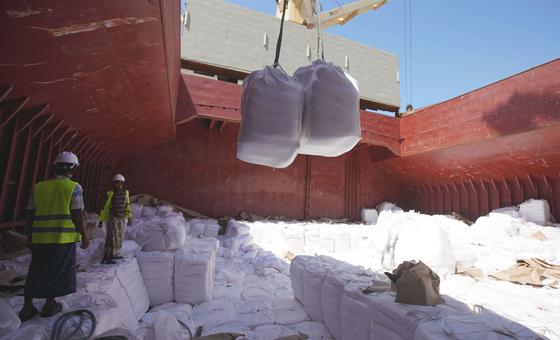The UN chief on Monday confirmed the UN would “do everything possible to preserve the integrity” of the Black Sea Grain Initiative – the deal agreed between Ukraine and Russia last July that is due to expire in just a few days.
Russia announced earlier that it would agree to a 60-day extension, which is half the number of days agreed when it first expired in November.
The UN-brokered deal also endorsed by Türkiye in Istanbul – which includes a Memorandum of Understanding between Russia and the UN to facilitate fertiliser exports – has allowed the exports of 24 million Metric Tonnes of grain, and over 1,600 secure vessel voyages through the Black Sea, with 55 per cent of food exports going to developing countries, said a note released to journalists in Geneva.
Talks with Russia
The press statement came following talks with a high-level Russian delegation on Monday at the UN in Geneva involving the top UN officials who facilitated the deal on behalf of Secretary-General António Guterres; Trade and Development chief Rebeca Grynspan, and relief chief, Martin Griffiths.
“The UN Secretary-General has confirmed that the UN will do everything possible to preserve the integrity of the Black Sea Grain Initiative and ensure its continuity”, the Note to Correspondents said.
“The UN’s support to the agreements made in Istanbul is part of the global response to the most severe cost-of-living crisis in a generation.”
UN committed to agreements
The UN Secretary-General expressed that the UN “remains fully committed to the Black Sea Grain Initiative, as well as to efforts to facilitate the export of Russian food and fertilizer.”
The FAO Food Price Index covering a basket of staple foods has now dropped for 10 consecutive months since reaching record high levels in March last year, “clearly demonstrating the positive impact of both agreements on global food prices”, the statement continued.
The UN said it noted the announcement made regarding an extension of the Black Sea Grain Initiative for 60 days by Russia.
‘Positive impact on global food security’
The two agreements have also had a “positive impact on global food security”, with millions of tons of grain reaching global markets, to alleviate the supply chain crisis stemming largely from Russia’s invasion of Ukraine.
“The continuation of the Black Sea Grain Initiative is crucial for global food security, as grain and fertilizer prices and availability have not returned to pre-war levels, causing hardship particularly in developing countries”, the statement concluded.

Wheat is processed at a granary in Chernihiv, Ukraine. (file)

